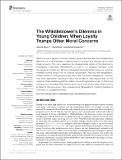The whistleblower’s dilemma in young children : when loyalty trumps other moral concerns
Abstract
When a group engages in immoral behavior, group members face the whistleblower's dilemma: the conflict between remaining loyal to the group and standing up for other moral concerns. This study examines the developmental origins of this dilemma by investigating 5-year-olds' whistleblowing on their in- vs. outgroup members' moral transgression. Children (n = 96) watched puppets representing their ingroup vs. outgroup members commit either a mild or a severe transgression. After the mild transgression, children tattled on both groups equally often. After the severe transgression, however, they were significantly less likely to blow the whistle on their ingroup than on the outgroup. These results suggest that children have a strong tendency to act on their moral concerns, but can adjust their behavior according to their group's need: When much is at stake for the ingroup (i.e., after a severe moral transgression), children's behavior is more likely to be guided by loyalty.
Citation
Misch , A , Over , H & Carpenter , M 2018 , ' The whistleblower’s dilemma in young children : when loyalty trumps other moral concerns ' , Frontiers in Psychology , vol. 9 , 250 . https://doi.org/10.3389/fpsyg.2018.00250
Publication
Frontiers in Psychology
Status
Peer reviewed
ISSN
1664-1078Type
Journal article
Collections
Items in the St Andrews Research Repository are protected by copyright, with all rights reserved, unless otherwise indicated.

